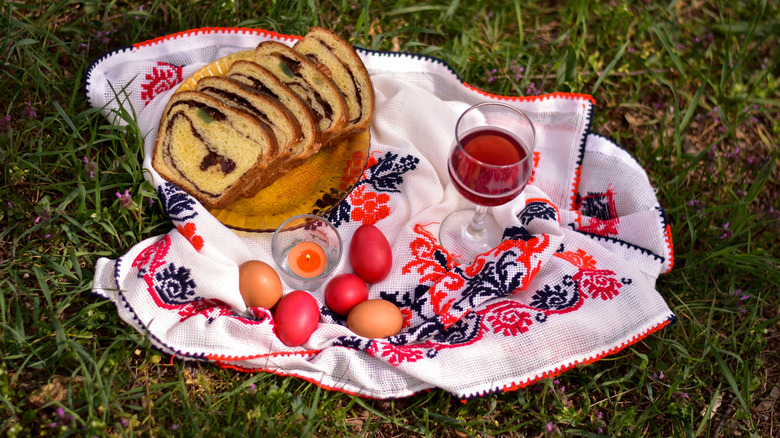Are There Any Rules For Drinks During Lent?
When Mardi Gras rolls around with all its bon temps, can Lent be far behind? No, not more than 24 hours behind at any rate, since the whole point of Fat-slash-Shrove Tuesday or Pancake Day is that it's the last chance for a carb-fat-sugar blowout before Ash Wednesday ushers in a 40-day fasting period. Well, fasting for some. While most Christian denominations observe the Lenten period as a time of reflection and prayer prior to the celebration of Christ's rebirth on Easter Sunday, the only major ones that involve mandatory fasting are the Roman Catholic and Orthodox churches. The reason for this is that most Protestant denominations see fasting as an individual choice.
While Lenten fast days in the Roman Catholic Church — Ash Wednesday and all of the Fridays during this period — involve abstinence from certain types of food, the United States Conference of Catholic Bishops lists no such stipulations regarding beverages. It's important to note that these fast days don't involve abstaining from food entirely, but merely limit the amount as well as the types of food that may be consumed. This means that even heartier beverages such as shakes and smoothies are permissible as these would not be considered full meals on their own. The only instance in which a beverage might enter questionable territory, theologically speaking, would be if it was made with meat broth or bouillon as these are considered meat-adjacent. Milk, however, is still permissible as it doesn't have a meaty flavor.
Things are different in the Orthodox church
Orthodox church doctrine requires a far stricter fast than is called for by the Roman Catholic Church. It's quite a bit more complicated, too, since Catholics only have to remember one Wednesday and half a dozen Fridays (well, technically seven, since Lent runs for six and a half weeks) but Orthodox Christians must abide by a rather complex calendar of changing fasting obligations. For the first three days (or two and a half, actually), a total fast may be involved, as is the case for the Monday, Tuesday, and Wednesday of Holy Week. At other times, most animal foods are proscribed, including not just meat but fish, eggs, and dairy. And yes, certain beverages are restricted, as well.
Since milk is a dairy product, the Orthodox faithful cannot drink it during Lent, although there seems to be no ban on plant-based substitutes. Wine and other alcoholic beverages, however, can only be consumed on weekends and certain feast days, which stands in contrast to the Roman Catholic church where giving up alcohol is a strictly voluntary observance. Starbucks olive oil-based drinks would also be forbidden fruit during Lent as olive oil, too, is in the restricted category. This means that Oleato cold brews, espressos, and lattes must be a weekend-only indulgence until Easter, which comes a bit later in the Orthodox church. While Roman Catholics and Protestants observe Lent starting on February 14 this year, Orthodox Lent begins on March 18 and Easter (Pascha) is May 5.

